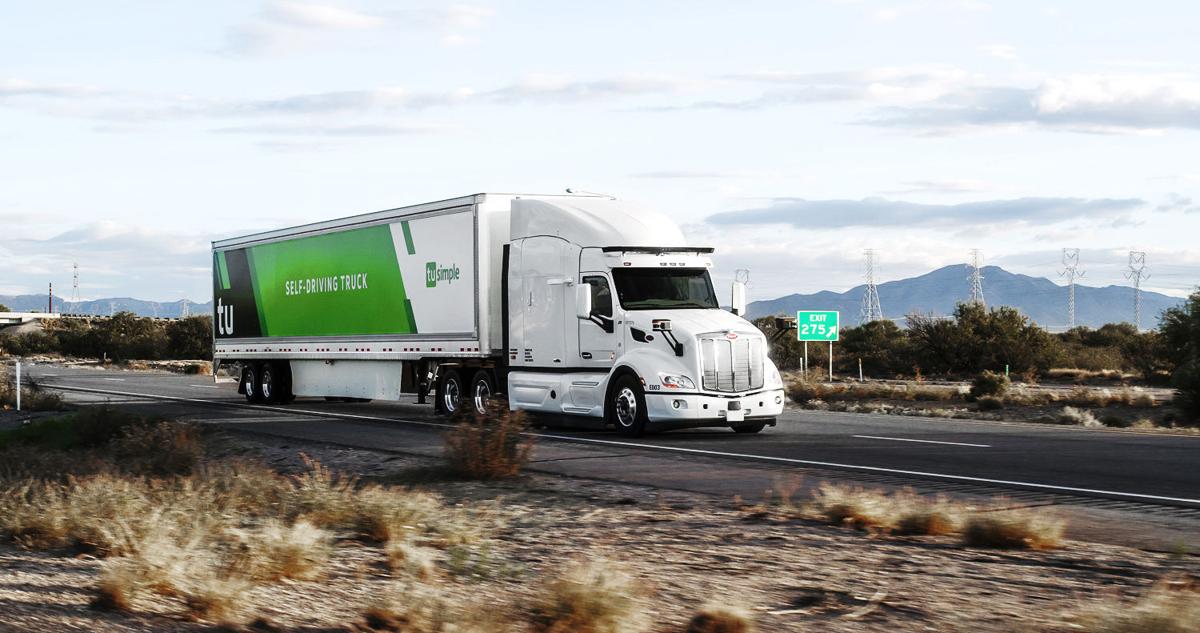TuSimple, which is developing self-driving truck technology in Tucson, has filed for a proposed initial public offering of stock with the aim of trading on the Nasdaq Stock Market.
But the proposed offer is facing federal regulatory scrutiny over TuSimple’s largest shareholder, part of a major Chinese internet technology and media company.
San Diego-based TuSimple filed a registration statement with the U.S. Securities and Exchange Commission to offer shares of its Class A common stock and intends to list its stock on the Nasdaq’s large-cap Global Select Market under the ticker symbol “TSP.”
The company, which employs more than 200 people and is expanding its technology center and freight hub on Tucson’s southeast side, has not yet determined the number of shares it will sell or the initial share price.
Morgan Stanley, Citigroup and J.P. Morgan will act as lead underwriters for the proposed offering, the company said. Lead underwriters, or “book runners,” solicit institutional investors to buy shares.
The company said in its filing that a committee made up of U.S. government agencies has sought information on a major purchase of private TuSimple stock by Sun Dream Inc., an affiliate of Chinese online giant Sina Corp.
TuSimple said the Committee on Foreign Investment in the United States has requested that the company file an informational notice on Sun Dream’s 2017 purchase of its Series B redeemable convertible preferred stock.
TuSimple lists Sun Dream and its CEO as its largest single shareholder, with a 20% share that would be converted to common shares upon completion of the public offering.
The foreign-investment committee has 45 days after accepting the notice to decide that the matter is not under its jurisdiction, clear the investment by concluding that it doesn’t represent a national security threat or decide to launch a 45-day investigation of the deal, TuSimple said in its filing.
After an investigation, the committee could order mitigation measures that could include limiting Sun Dream’s corporate governance rights, and President Joe Biden could order the company to divest its holdings, the company said.
TuSimple officials declined to comment further, citing a regulatory quiet period that kicked in when it filed its IPO proposal.
Chinese investments have come under increased scrutiny in recent years as potential national security risks.
The Committee on Foreign Investment opened an investigation last year into China-based ByteDance’s $1 billion acquisition of Musical.ly, which had millions of U.S. users and was later folded into the short-video site and app TikTok.
Last August, former President Donald Trump issued executive orders requiring ByteDance to find a U.S. buyer for TikTok, as well as an order aimed at banning the Chinese-based mobile messaging app WeChat from use in the U.S.
But those orders, as well as U.S. Commerce Department bans on TikTok and WeChat, have been suspended by court injunctions won by TikTok and its users and WeChat users.
TuSimple has been running paid loads from its Tucson test center since 2017, with a driver and engineer aboard as the company awaits regulatory approval for fully driverless operations. The company, which was founded and is led by Chinese scientists and entrepreneurs, is also testing autonomous trucks in China through a hub and development center in Shanghai.
TuSimple — which has raised more than $600 million in private investments since 2017 — says that its systems can potentially save users up to 40% on operating costs, while addressing a current shortage of some 60,000 truck drivers expected to double over the next few years.
In July, the company launched the TuSimple Autonomous Freight Network to manage and monitor a network of trucking routes initially extending along Interstate 10 from Phoenix to Tucson, then to El Paso, San Antonio, and Houston, with connecting routes along I-20 from El Paso to Dallas, I-45 between Dallas and Houston, and I-35 between Dallas and San Antonio.
TuSimple is developing self-driving trucks with truckmaker Navistar, which owns a 6.5% stake in TuSimple after investing in the company and agreeing to co-develop an autonomous semi-truck last year.
The companies are taking reservations for a purpose-built autonomous semi-truck for commercial production by 2024 for the U.S. market, TuSimple said.
TuSimple’s IPO filing shows that it is still racking up significant losses as it plows money into research and development.
The company reported a net loss of $199 million in 2020, after spending $132 million on research and development. The company posted a loss of $145 million in 2019 and $45 million in 2018.
TuSimple reported revenue of $1.8 million last year, compared with 2019 revenue of $710,00, the company’s IPO filing shows.
At the end of 2020, the company had $311 million in cash and equivalents and $238 million in working capital, essentially the amount of available capital that a company can readily use for day-to-day operations.





